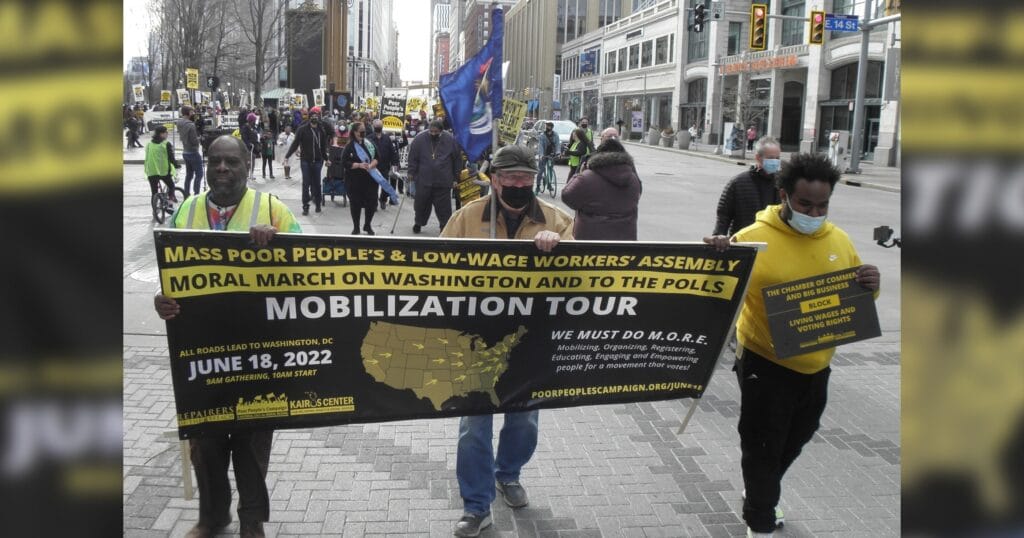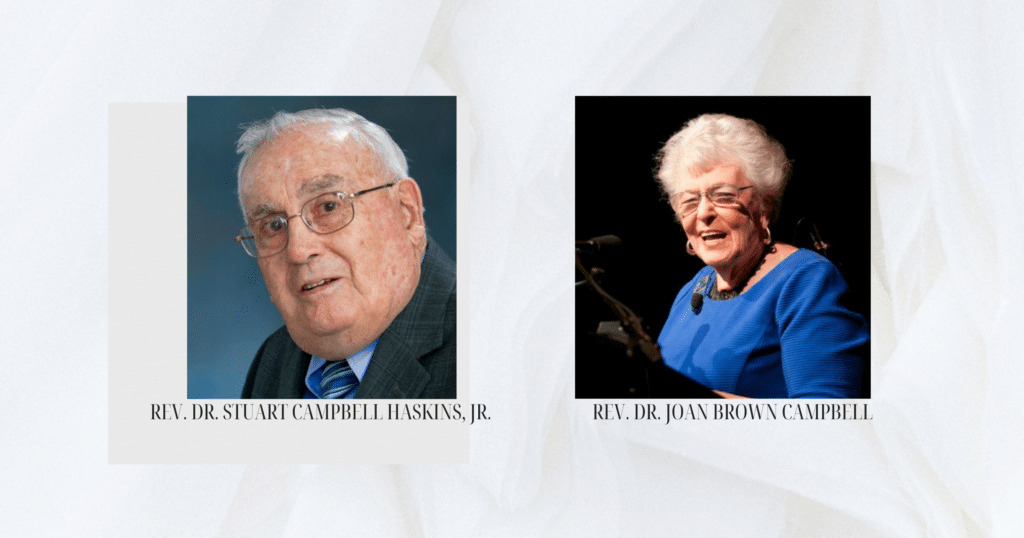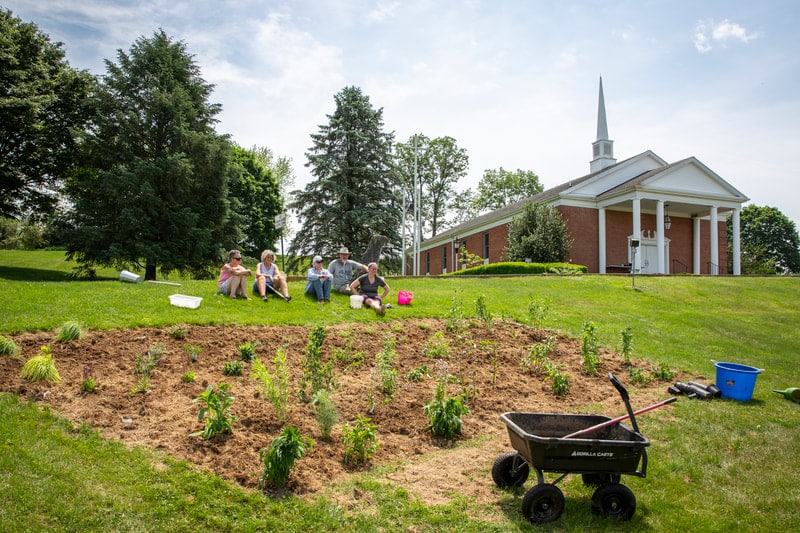Poor People’s Campaign on road again, headed for mass D.C. rally June 18
A poor people’s march on the nation’s capital hit a roadblock in 2020. COVID-19 forced it online. This year, with the pandemic waning, leaders of the Poor People’s Campaign are headed for Washington, D.C., again.
They’re on a nationwide tour, urging busloads of “poor and low-income people” — and their allies — to come to Washington June 18 to demand change.
Stopping in Cleveland March 14, they attracted hundreds of supporters. The downtown crowd carried signs and banners as they walked from a rally at U.S. Bank Plaza to a “mass meeting” at Trinity (Episcopal) Cathedral. People from at least a half-dozen United Church of Christ congregations were among them. A full 2-hour, 47-minute video of the rally, march and meeting can be found at the campaign’s YouTube channel, here.
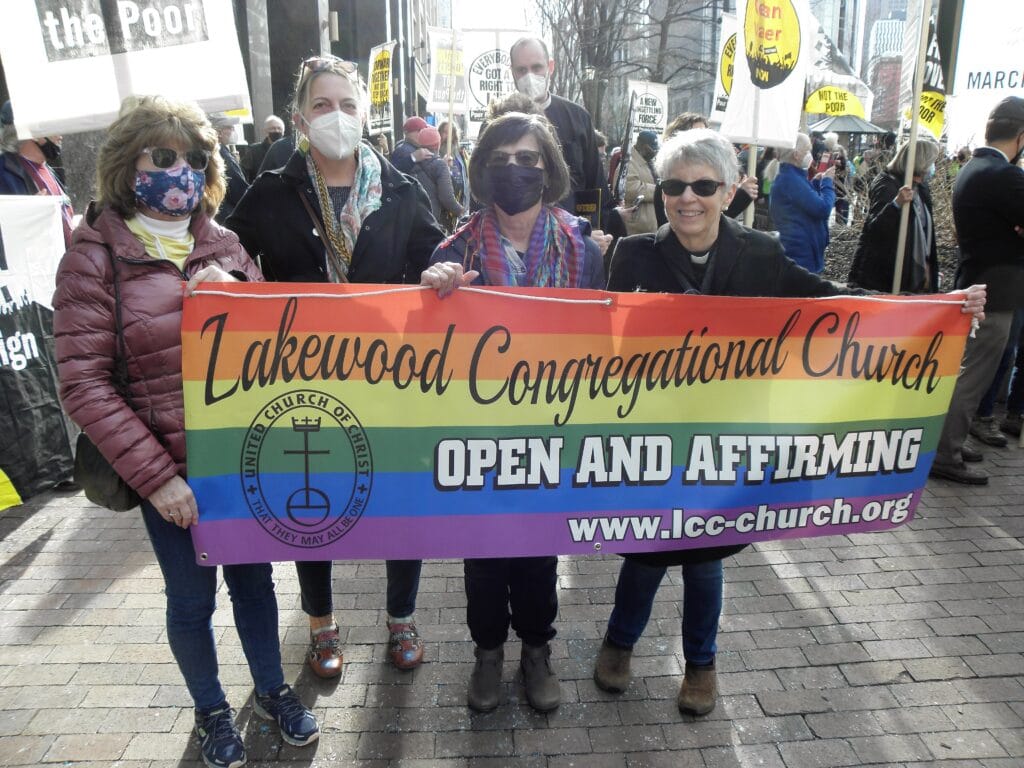
‘Change the moral narrative’
That kind of visibility — on main streets like Cleveland’s Euclid Avenue — is essential, said the Rev. William Barber II, the Christian Church (Disciples of Christ) minister who co-chairs the national campaign. “We are not going to allow the issue of poverty and low wealth to be on back streets anymore,” he said.
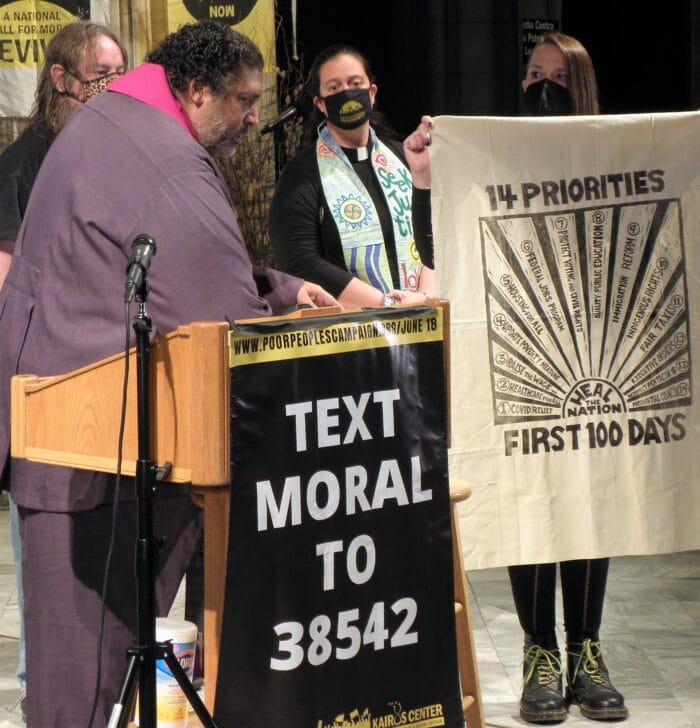
“We’re mobilizing, letting people know about June 18, because we are damn tired of poverty being last in the public discussion,” Barber said. “You cannot have 43 percent of the people (remain) poor and low-wealth in a country with a $21 trillion gross domestic product. … During COVID, billionaires made $2 trillion and 8 million more people fell into poverty.
“It does not have to be this way. We are not going to be silent anymore. We’re going to change the moral narrative of this country. It’s time for a third reconstruction. We know how to fix it.”
Economic proposals
The campaign has described that “fix” in rallies, news conferences and many documents at its website. Much of it revolves around federal policies and spending priorities. For example:
- The “third reconstruction” Barber mentioned is, among other things, a proposed resolution that the campaign helped bring to Congress in 2021. Still in committee, it pushes for “fully addressing poverty and low wages from the bottom up.”
- One of the campaign’s central proposals is its Poor People’s Moral Budget, with the subheading “Everybody Has the Right to Live.”
- In Cleveland, Barber stood by a sign summarizing the campaign’s “14 Policy Priorities to Heal the Nation.” They range from raising the minimum wage, to protecting voting and civil rights, to reforming immigration policy.
Another part of the fix, Barber said, is to get poor people to vote. That’s why the long title of the June 18 action is “Mass Poor People’s and Low-Wage Workers’ Assembly and Moral March on Washington and to the Polls.” The website has a section — strictly nonpartisan, as are all aspects of the campaign — on “The Power of Poor Voters.”
From book study to street
Nationally, the UCC is one of the campaign’s “Mobilizing Partners.” UCC churches are among those turning out for local rallies and organizing June 18 trips to D.C.
At the Cleveland rally, area participants were sighted from Amistad Chapel UCC, Archwood UCC, Church of the Redeemer, Lakewood Congregational UCC, Pilgrim Congregational UCC, St. Paul’s Community Church and West Park UCC.
Marching behind the Lakewood Congregational banner were members of the church’s book-study group. They’ve been reading Barber’s 2016 book, “The Third Reconstruction.” Two other members of the church who’ve been long active in the campaign — Heather and Eric Tuck-Macalla — encouraged them to come.
‘Won’t be silent anymore’
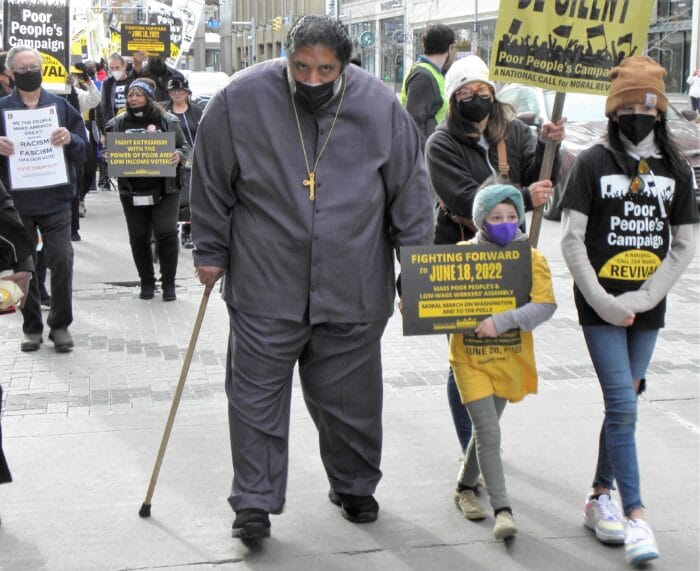
Since 2018, the campaign’s online and in-person rallies have featured testimonies about poverty and other interlocking social ills. In Cleveland, these came from rural areas as well as cities in Ohio and its surrounding states. People described being hurt by low pay, polluted water, strip mining, poor health care, gun violence, lack of insurance and more. The cathedral crowd responded to each story by chanting, “And we won’t be silent anymore.”
“The heart of this country must be broken,” Barber said. “Their conscience must be shaken. And that’s why they need to hear the pain. But then after we put the pain before them, they’ve got to hear the answers. We can’t just curse the darkness. We must be the light.”
Content on ucc.org is copyrighted by the National Setting of the United Church of Christ and may be only shared according to the guidelines outlined here.
Related News
Peace Be With You…
“…And also with you” is the response on Sunday mornings and on occasions where the peace...
Read MoreBreaking barriers and forging loving partnerships: Two servants of God are remembered
This Eastertide, the United Church of Christ remembers the Rev. Dr. Joan Brown Campbell and...
Read MoreGetting down and dirty in the soil: Rural congregation discovers ‘life has the last word’
The Rev. Julia L. Brown has a love/hate relationship with this time of year. “I dislike...
Read More
